MGT601 Dynamic Leadership: Self-Reflection and Strengths Analysis
VerifiedAdded on 2022/11/25
|6
|884
|266
Report
AI Summary
This report presents a self-reflective analysis of dynamic leadership, focusing on the student's strengths and weaknesses as revealed by the Gallup StrengthsFinder assessment. The student identifies innovation, integrity, and purpose as key strengths, providing detailed explanations and supporting evidence. The analysis explores how these strengths contribute to effective leadership, emphasizing the importance of consistent decision-making, teamwork, and goal-oriented behavior. The report also addresses areas for development, such as problem-solving, determination, and focus, with plans for improvement. References to relevant literature support the student's self-assessment and provide a framework for understanding dynamic leadership principles.
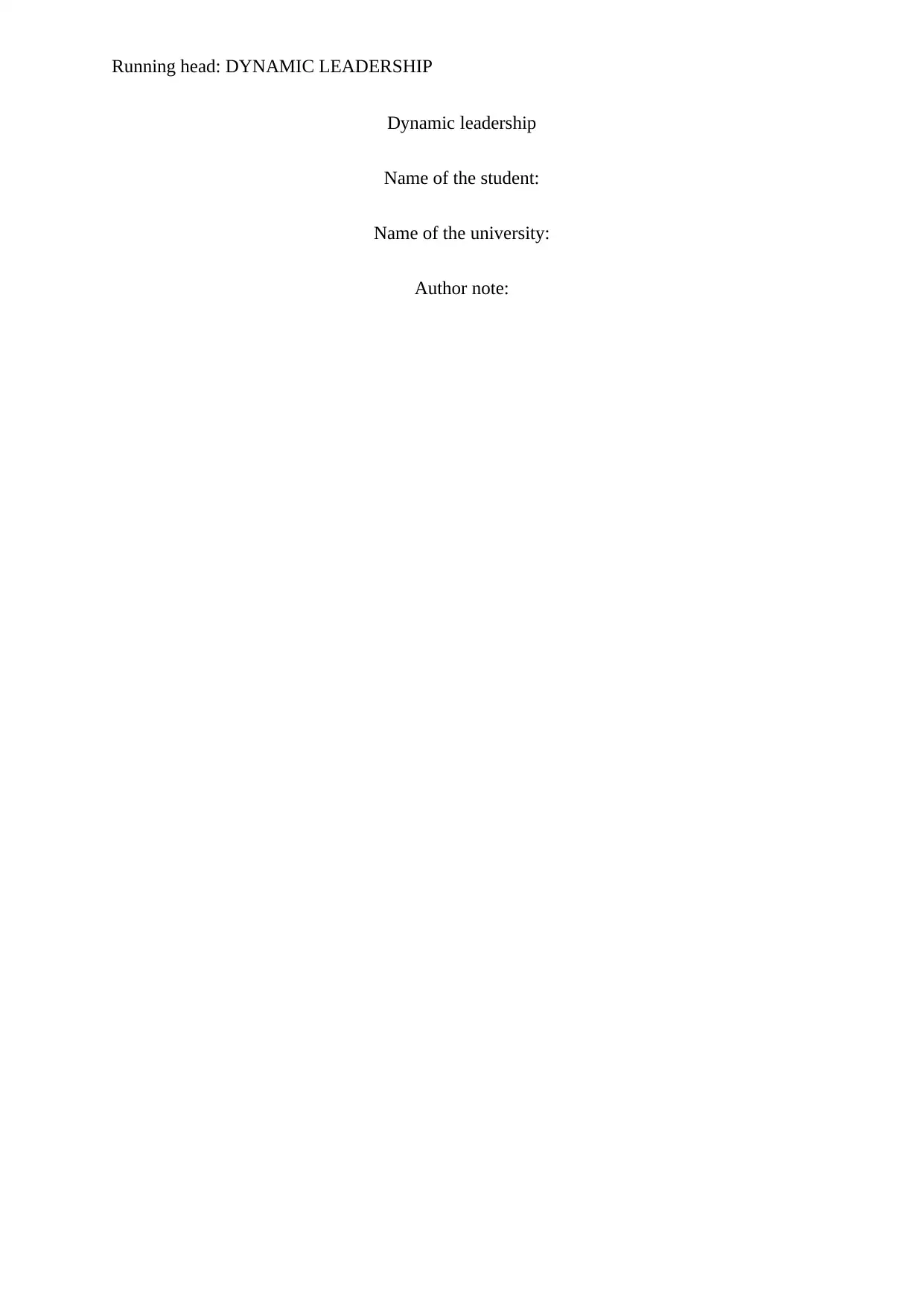
Running head: DYNAMIC LEADERSHIP
Dynamic leadership
Name of the student:
Name of the university:
Author note:
Dynamic leadership
Name of the student:
Name of the university:
Author note:
Paraphrase This Document
Need a fresh take? Get an instant paraphrase of this document with our AI Paraphraser
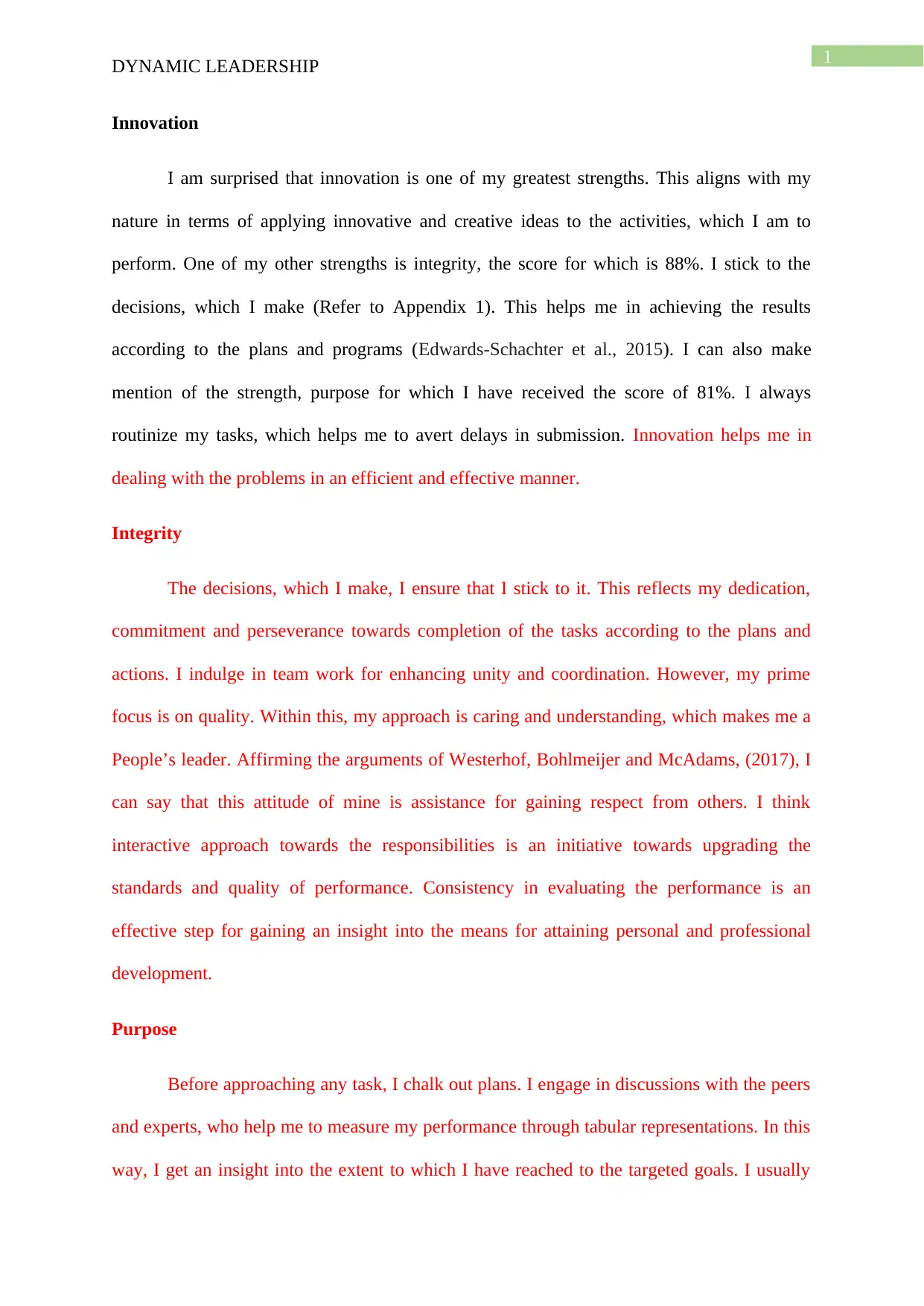
1
DYNAMIC LEADERSHIP
Innovation
I am surprised that innovation is one of my greatest strengths. This aligns with my
nature in terms of applying innovative and creative ideas to the activities, which I am to
perform. One of my other strengths is integrity, the score for which is 88%. I stick to the
decisions, which I make (Refer to Appendix 1). This helps me in achieving the results
according to the plans and programs (Edwards-Schachter et al., 2015). I can also make
mention of the strength, purpose for which I have received the score of 81%. I always
routinize my tasks, which helps me to avert delays in submission. Innovation helps me in
dealing with the problems in an efficient and effective manner.
Integrity
The decisions, which I make, I ensure that I stick to it. This reflects my dedication,
commitment and perseverance towards completion of the tasks according to the plans and
actions. I indulge in team work for enhancing unity and coordination. However, my prime
focus is on quality. Within this, my approach is caring and understanding, which makes me a
People’s leader. Affirming the arguments of Westerhof, Bohlmeijer and McAdams, (2017), I
can say that this attitude of mine is assistance for gaining respect from others. I think
interactive approach towards the responsibilities is an initiative towards upgrading the
standards and quality of performance. Consistency in evaluating the performance is an
effective step for gaining an insight into the means for attaining personal and professional
development.
Purpose
Before approaching any task, I chalk out plans. I engage in discussions with the peers
and experts, who help me to measure my performance through tabular representations. In this
way, I get an insight into the extent to which I have reached to the targeted goals. I usually
DYNAMIC LEADERSHIP
Innovation
I am surprised that innovation is one of my greatest strengths. This aligns with my
nature in terms of applying innovative and creative ideas to the activities, which I am to
perform. One of my other strengths is integrity, the score for which is 88%. I stick to the
decisions, which I make (Refer to Appendix 1). This helps me in achieving the results
according to the plans and programs (Edwards-Schachter et al., 2015). I can also make
mention of the strength, purpose for which I have received the score of 81%. I always
routinize my tasks, which helps me to avert delays in submission. Innovation helps me in
dealing with the problems in an efficient and effective manner.
Integrity
The decisions, which I make, I ensure that I stick to it. This reflects my dedication,
commitment and perseverance towards completion of the tasks according to the plans and
actions. I indulge in team work for enhancing unity and coordination. However, my prime
focus is on quality. Within this, my approach is caring and understanding, which makes me a
People’s leader. Affirming the arguments of Westerhof, Bohlmeijer and McAdams, (2017), I
can say that this attitude of mine is assistance for gaining respect from others. I think
interactive approach towards the responsibilities is an initiative towards upgrading the
standards and quality of performance. Consistency in evaluating the performance is an
effective step for gaining an insight into the means for attaining personal and professional
development.
Purpose
Before approaching any task, I chalk out plans. I engage in discussions with the peers
and experts, who help me to measure my performance through tabular representations. In this
way, I get an insight into the extent to which I have reached to the targeted goals. I usually
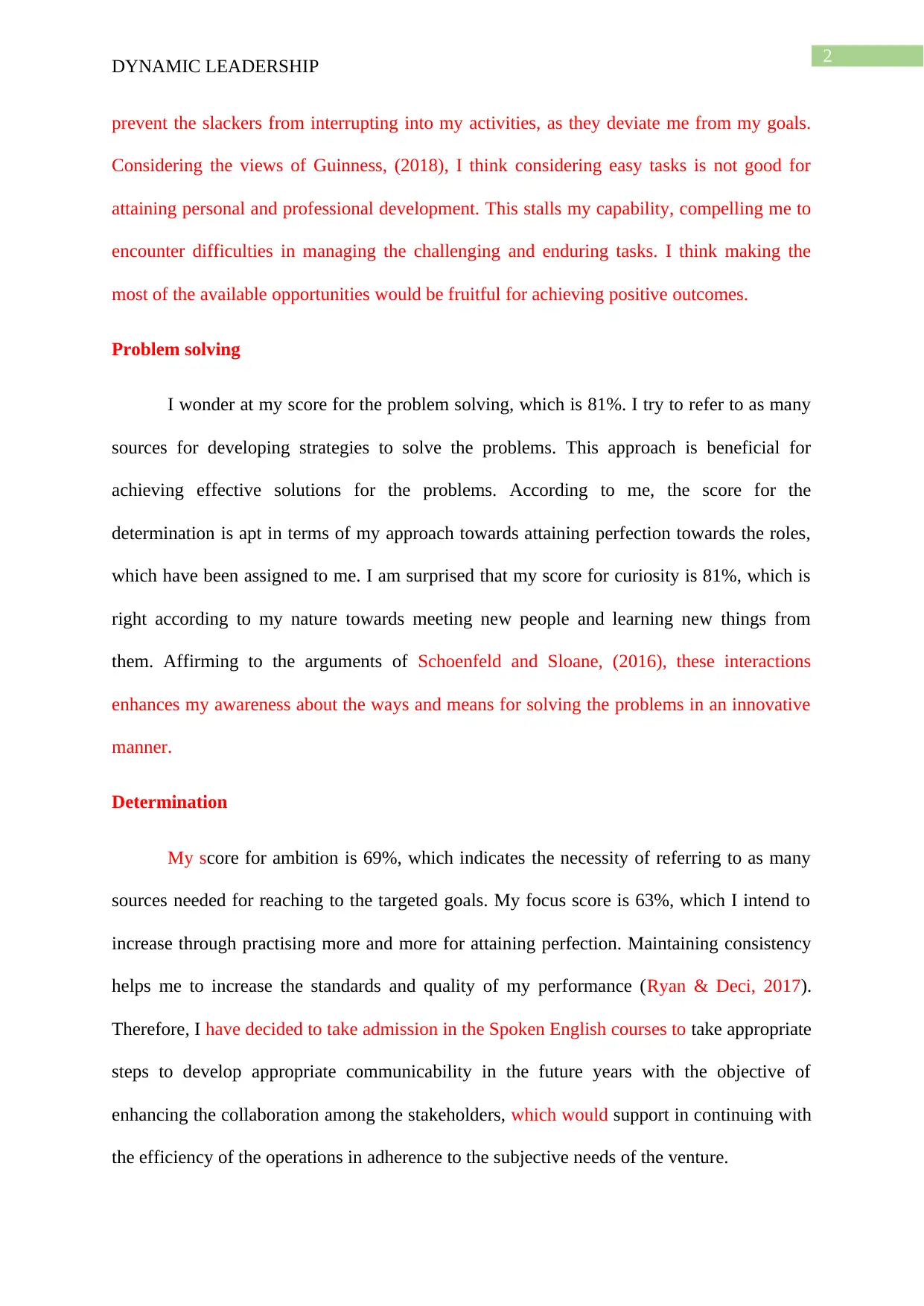
2
DYNAMIC LEADERSHIP
prevent the slackers from interrupting into my activities, as they deviate me from my goals.
Considering the views of Guinness, (2018), I think considering easy tasks is not good for
attaining personal and professional development. This stalls my capability, compelling me to
encounter difficulties in managing the challenging and enduring tasks. I think making the
most of the available opportunities would be fruitful for achieving positive outcomes.
Problem solving
I wonder at my score for the problem solving, which is 81%. I try to refer to as many
sources for developing strategies to solve the problems. This approach is beneficial for
achieving effective solutions for the problems. According to me, the score for the
determination is apt in terms of my approach towards attaining perfection towards the roles,
which have been assigned to me. I am surprised that my score for curiosity is 81%, which is
right according to my nature towards meeting new people and learning new things from
them. Affirming to the arguments of Schoenfeld and Sloane, (2016), these interactions
enhances my awareness about the ways and means for solving the problems in an innovative
manner.
Determination
My score for ambition is 69%, which indicates the necessity of referring to as many
sources needed for reaching to the targeted goals. My focus score is 63%, which I intend to
increase through practising more and more for attaining perfection. Maintaining consistency
helps me to increase the standards and quality of my performance (Ryan & Deci, 2017).
Therefore, I have decided to take admission in the Spoken English courses to take appropriate
steps to develop appropriate communicability in the future years with the objective of
enhancing the collaboration among the stakeholders, which would support in continuing with
the efficiency of the operations in adherence to the subjective needs of the venture.
DYNAMIC LEADERSHIP
prevent the slackers from interrupting into my activities, as they deviate me from my goals.
Considering the views of Guinness, (2018), I think considering easy tasks is not good for
attaining personal and professional development. This stalls my capability, compelling me to
encounter difficulties in managing the challenging and enduring tasks. I think making the
most of the available opportunities would be fruitful for achieving positive outcomes.
Problem solving
I wonder at my score for the problem solving, which is 81%. I try to refer to as many
sources for developing strategies to solve the problems. This approach is beneficial for
achieving effective solutions for the problems. According to me, the score for the
determination is apt in terms of my approach towards attaining perfection towards the roles,
which have been assigned to me. I am surprised that my score for curiosity is 81%, which is
right according to my nature towards meeting new people and learning new things from
them. Affirming to the arguments of Schoenfeld and Sloane, (2016), these interactions
enhances my awareness about the ways and means for solving the problems in an innovative
manner.
Determination
My score for ambition is 69%, which indicates the necessity of referring to as many
sources needed for reaching to the targeted goals. My focus score is 63%, which I intend to
increase through practising more and more for attaining perfection. Maintaining consistency
helps me to increase the standards and quality of my performance (Ryan & Deci, 2017).
Therefore, I have decided to take admission in the Spoken English courses to take appropriate
steps to develop appropriate communicability in the future years with the objective of
enhancing the collaboration among the stakeholders, which would support in continuing with
the efficiency of the operations in adherence to the subjective needs of the venture.
⊘ This is a preview!⊘
Do you want full access?
Subscribe today to unlock all pages.

Trusted by 1+ million students worldwide
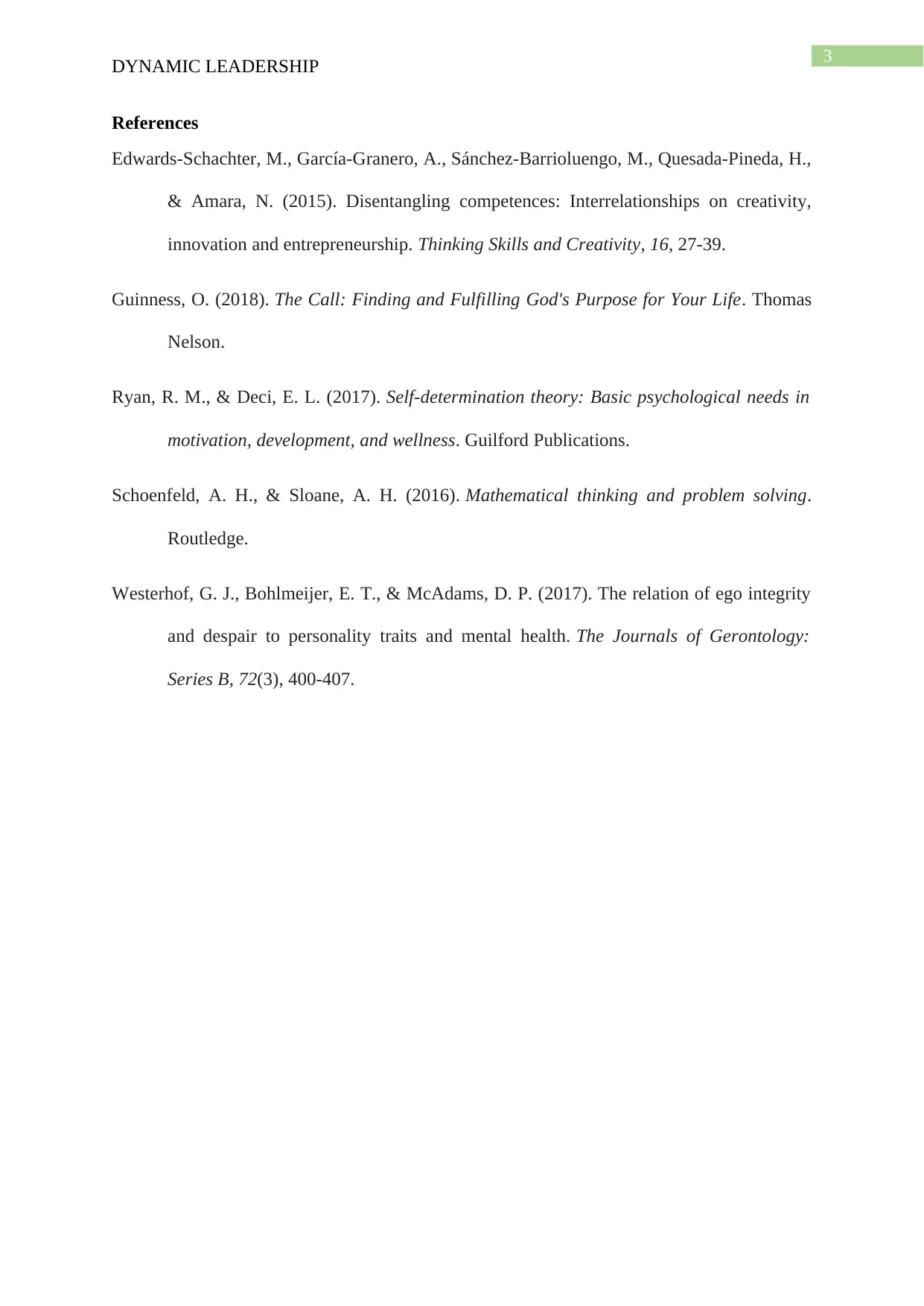
3
DYNAMIC LEADERSHIP
References
Edwards-Schachter, M., García-Granero, A., Sánchez-Barrioluengo, M., Quesada-Pineda, H.,
& Amara, N. (2015). Disentangling competences: Interrelationships on creativity,
innovation and entrepreneurship. Thinking Skills and Creativity, 16, 27-39.
Guinness, O. (2018). The Call: Finding and Fulfilling God's Purpose for Your Life. Thomas
Nelson.
Ryan, R. M., & Deci, E. L. (2017). Self-determination theory: Basic psychological needs in
motivation, development, and wellness. Guilford Publications.
Schoenfeld, A. H., & Sloane, A. H. (2016). Mathematical thinking and problem solving.
Routledge.
Westerhof, G. J., Bohlmeijer, E. T., & McAdams, D. P. (2017). The relation of ego integrity
and despair to personality traits and mental health. The Journals of Gerontology:
Series B, 72(3), 400-407.
DYNAMIC LEADERSHIP
References
Edwards-Schachter, M., García-Granero, A., Sánchez-Barrioluengo, M., Quesada-Pineda, H.,
& Amara, N. (2015). Disentangling competences: Interrelationships on creativity,
innovation and entrepreneurship. Thinking Skills and Creativity, 16, 27-39.
Guinness, O. (2018). The Call: Finding and Fulfilling God's Purpose for Your Life. Thomas
Nelson.
Ryan, R. M., & Deci, E. L. (2017). Self-determination theory: Basic psychological needs in
motivation, development, and wellness. Guilford Publications.
Schoenfeld, A. H., & Sloane, A. H. (2016). Mathematical thinking and problem solving.
Routledge.
Westerhof, G. J., Bohlmeijer, E. T., & McAdams, D. P. (2017). The relation of ego integrity
and despair to personality traits and mental health. The Journals of Gerontology:
Series B, 72(3), 400-407.
Paraphrase This Document
Need a fresh take? Get an instant paraphrase of this document with our AI Paraphraser
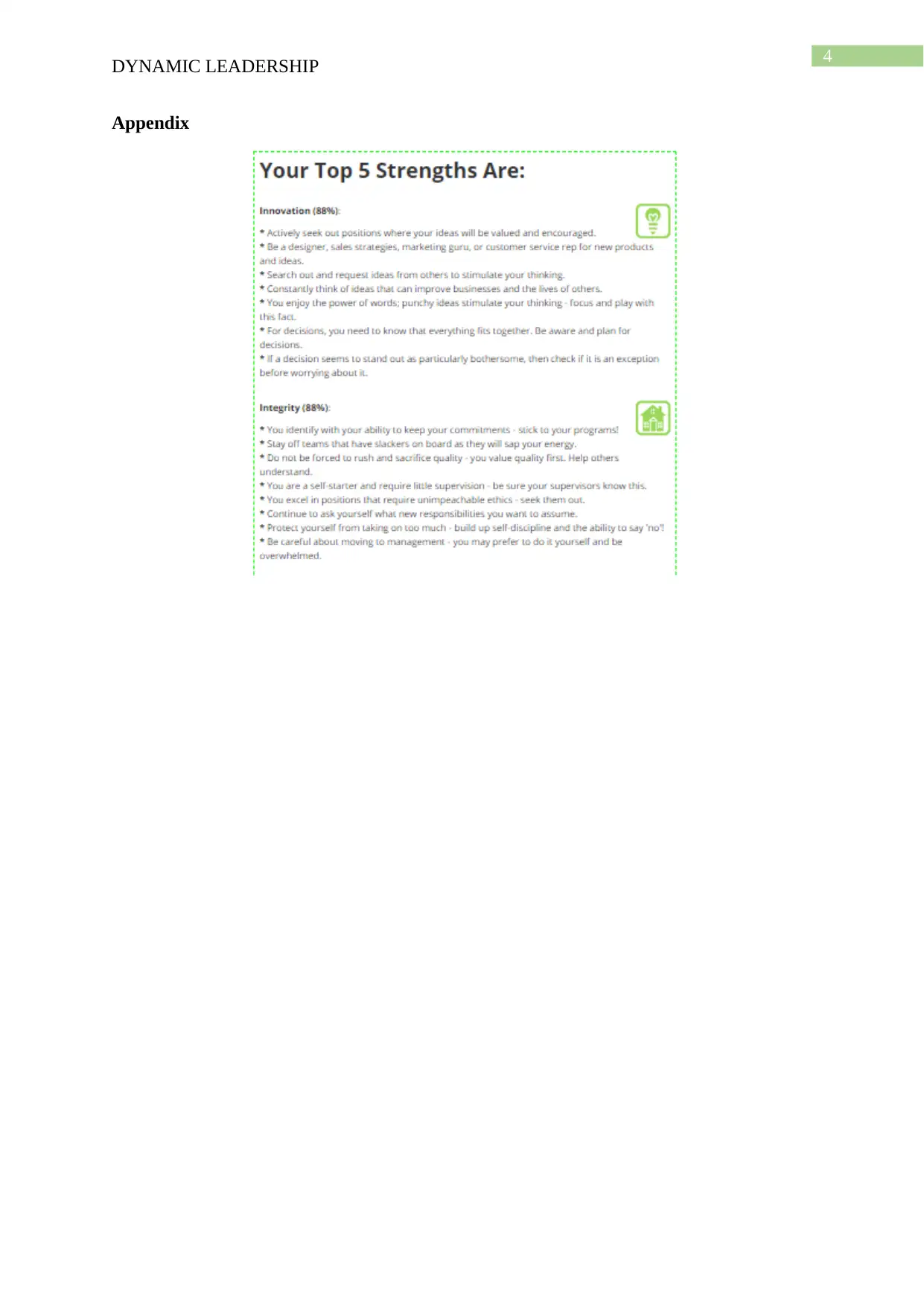
4
DYNAMIC LEADERSHIP
Appendix
DYNAMIC LEADERSHIP
Appendix
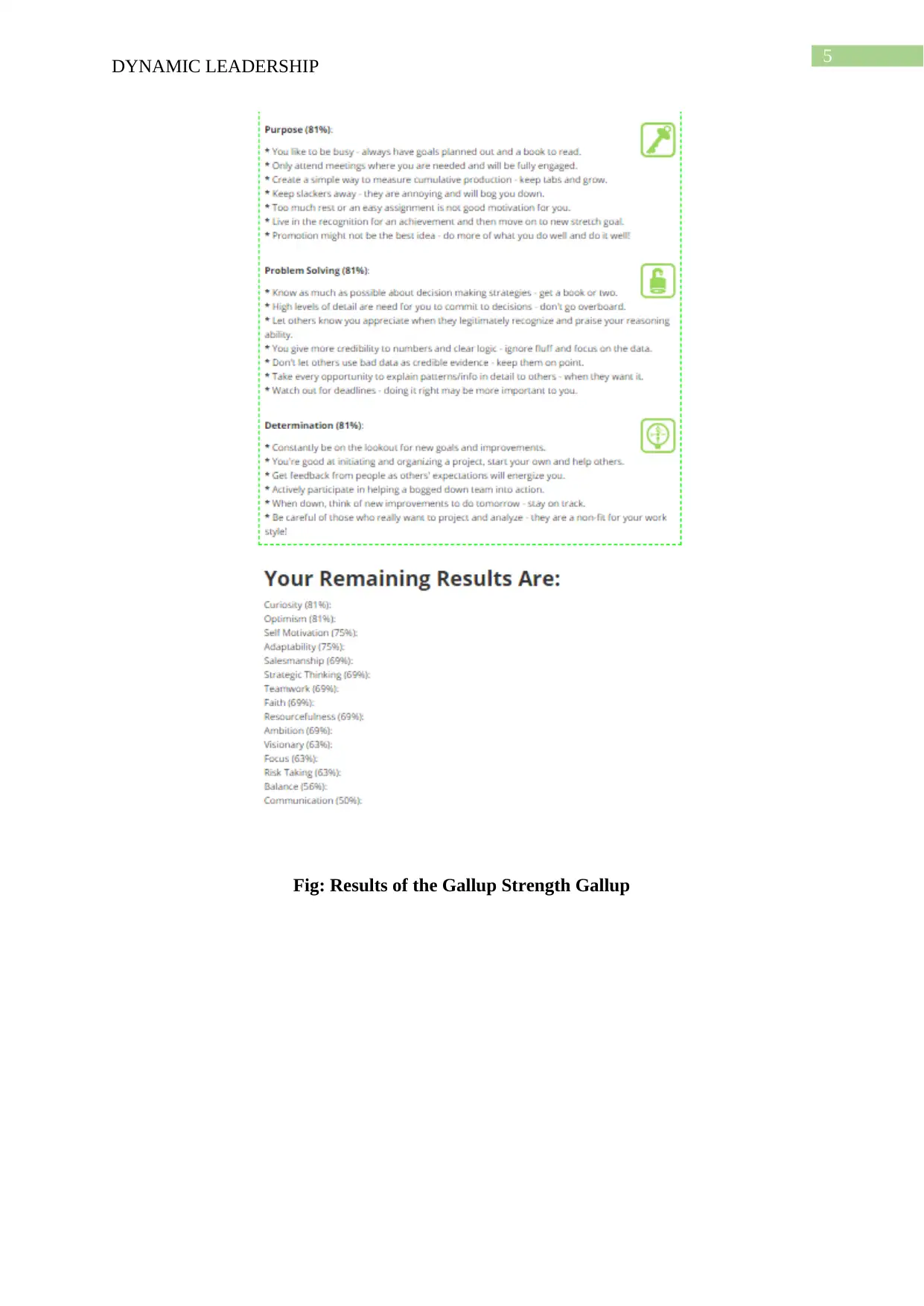
5
DYNAMIC LEADERSHIP
Fig: Results of the Gallup Strength Gallup
DYNAMIC LEADERSHIP
Fig: Results of the Gallup Strength Gallup
⊘ This is a preview!⊘
Do you want full access?
Subscribe today to unlock all pages.

Trusted by 1+ million students worldwide
1 out of 6
Related Documents
Your All-in-One AI-Powered Toolkit for Academic Success.
+13062052269
info@desklib.com
Available 24*7 on WhatsApp / Email
![[object Object]](/_next/static/media/star-bottom.7253800d.svg)
Unlock your academic potential
Copyright © 2020–2025 A2Z Services. All Rights Reserved. Developed and managed by ZUCOL.




